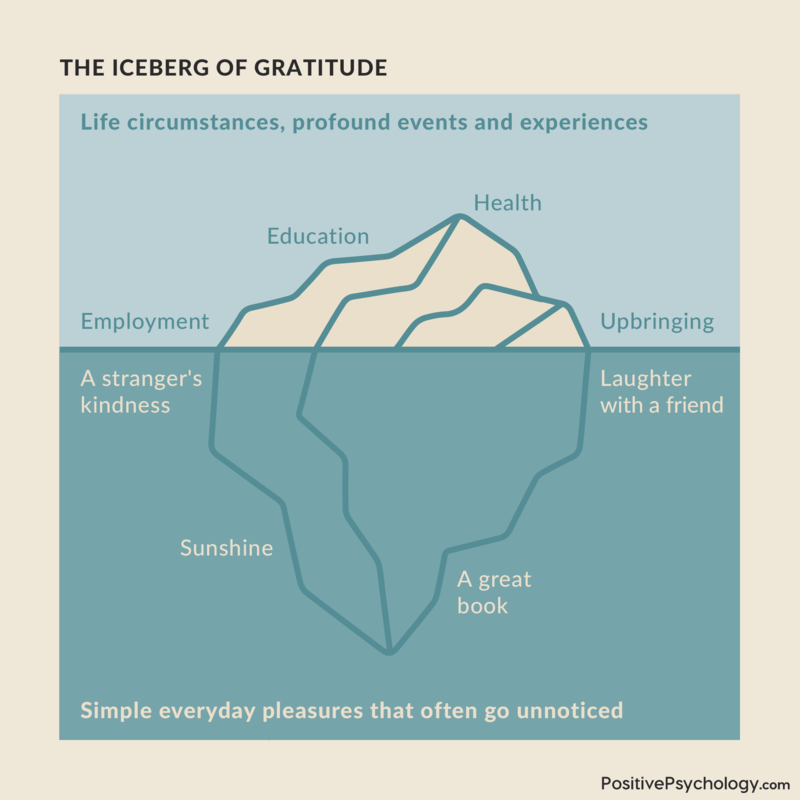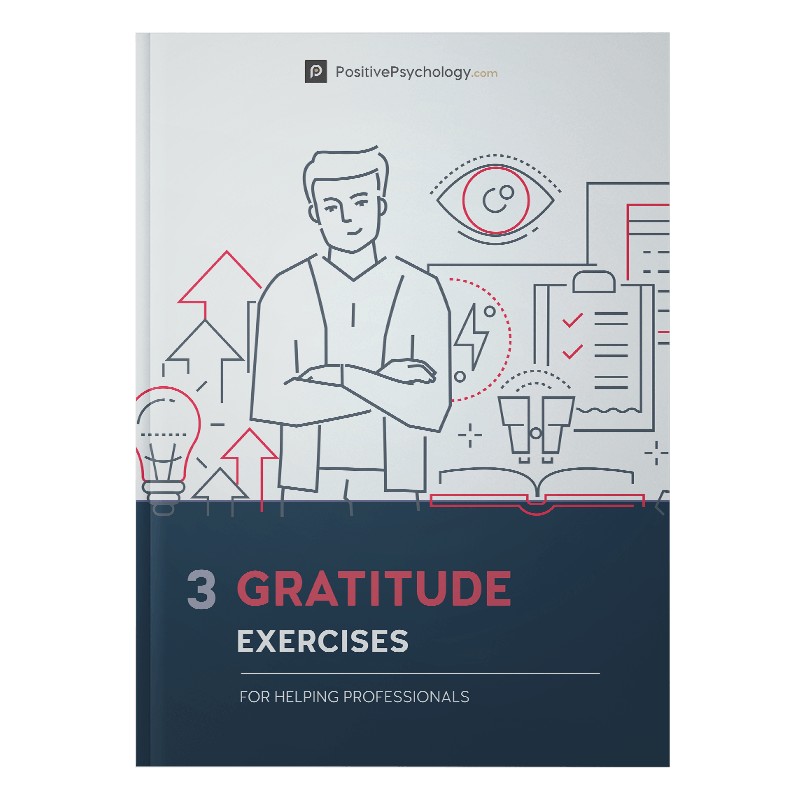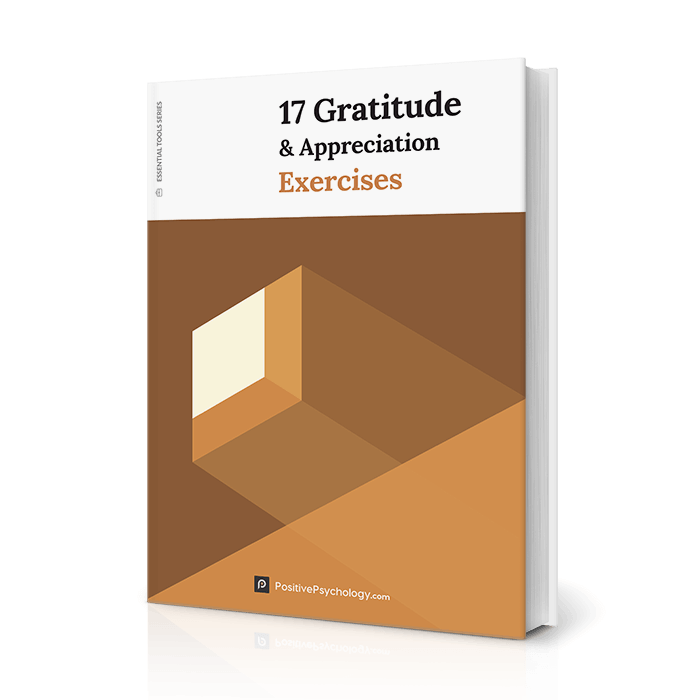 When you feel down in the dumps or find yourself in a funk, how do you cope?
When you feel down in the dumps or find yourself in a funk, how do you cope?
Do you turn to junk food, self-medication, shopping, etc.?
One healthy, powerful, and free strategy to rise from this temporary emotional state is to practice gratitude.
Gratitude turns what little you have into abundance.
Gratitude is so much more than saying thank you.
Gratitude changes your perspective of your world.
But yet you wonder how you can find the positive when everything seems so bleak? Read on to learn how to identify the positive when it seems there is nothing to be grateful for. We’ll also explain the importance of gratitude, how to show it to others, and share gratitude and appreciation videos.
Before you continue, we thought you might like to download our three Gratitude Exercises for free. These detailed, science-based exercises will help you or your clients connect to more positive emotions and enjoy the benefits of gratitude.
This Article Contains:
- What is Gratitude – Its Meaning & Definition
- Gratitude & Positive Psychology – What is the Connection?
- Why Is It Important to Be Grateful?
- The Importance of Gratitude in Life
- The Importance of Thanksgiving
- How to Show Gratitude and Appreciation
- 5 YouTube Gratitude Videos
- A Take-Home Message
- References
What is Gratitude – Its Meaning & Definition
Gratitude is an emotion similar to appreciation. The American Psychological Association (n.d.) more specifically defines this phenomenon as a sense of happiness and thankfulness in response to a fortunate happenstance or tangible gift.
Gratitude is both a state and a trait (Jans-Beken et al., 2020). Better explained, one can experience gratitude for someone or something at a certain moment in time, and someone experience gratitude more long-term as a positive character trait.
According to Dr. Robert Emmons, the feeling of gratitude involves two stages (Emmons & McCullough, 2003):
First comes the acknowledgment of goodness in one’s life. In a state of gratitude, we say yes to life. We affirm that, all in all, life is good and has elements that make it worth living. The acknowledgment that we have received something gratifies us, both by its presence and by the effort the giver put into choosing it.
Second, gratitude is recognizing that sources of this goodness lie outside the self. One can be grateful to our creator, other people, animals, and the world, but not to oneself. At this stage, we recognize the goodness in our lives and who to thank for it.
The two stages of gratitude comprise the recognition of the goodness in our lives and then how this goodness came to us. Through this process, we recognize the fortune of everything that improves our lives and ourselves.
Further, gratitude can be considered either a dispositional trait or a state of being.
As a trait, an individual practices gratitude as part of their daily life (McCullough et al., 2002), and it is considered a character strength. It is important to remember that gratitude is a strength that can be enhanced with awareness and practice.
When a person experiences the emotion from someone expressing gratitude for them, it is referred to as a state (Watkins et al., 2009).
Gratitude & Positive Psychology – What is the Connection?
 As we already know, positive psychology focuses on positive thoughts and behaviors. Its constructs include optimism, hope, and, you guessed it – gratitude (Iodice et al., 2021).
As we already know, positive psychology focuses on positive thoughts and behaviors. Its constructs include optimism, hope, and, you guessed it – gratitude (Iodice et al., 2021).
As part of Seligman’s PERMA model, which includes positive emotion, engagement, relationships, meaning, and achievement, a key positive emotion includes gratitude (Lianov, 2021).
Robert Emmons has led positive psychology’s expansion of research on the importance of gratitude. Emmons has authored several papers on the psychology of gratitude, showing that being more grateful can lead to increased levels of wellbeing (Emmons & Crumpler, 2000).
Some of Emmons’s work has also specifically dealt with gratitude in a religious setting, highlighting how gratitude towards a higher power may lead to increased physical health (Krause et al., 2015). There will be more on gratitude and religion later.
Why Is It Important to Be Grateful?
Passmore and Oades (2016) assert that as expectations have changed, gratitude has diminished in western society. Possessions and health are expectations for many individuals rather than considered personal ‘blessings’ that are appreciated. “Gratitude has, for many, been replaced by disappointment, anger, and resentment when these expected ‘blessings’ either do not appear or they disappear” (Passmore & Oades, 2016, p. 43).
We have learned gratitude helps people focus on the positive aspects of their life. Gratitude can help build and maintain relationships with others, resulting in hope, life satisfaction, and more proactive behaviors toward others (Passmore & Oades, 2016).
If you still aren’t convinced, you may wish to pick up one of the books suggested in our Gratitude Books article.
The Importance of Gratitude in Life
 Gratitude is strongly related to wellbeing (Jans-Beken et al., 2020; Wood et al., 2010). The positive effects of experiencing and expressing gratitude are endless.
Gratitude is strongly related to wellbeing (Jans-Beken et al., 2020; Wood et al., 2010). The positive effects of experiencing and expressing gratitude are endless.
Gratitude has been found to be beneficially associated with social wellbeing, emotional wellbeing, and psychological wellbeing (Jans-Beken et al., 2020). It is no surprise that trait gratitude is an important “predictor of wellbeing and other desirable life outcomes” (Portocarrero et al., 2020, p. 6).
Gratitude appears to have a domino effect. If a person experiences gratitude, they are more likely to recognize the help and then later reciprocate that help (Wood et al., 2010). People who are thanked are presumably more apt to extend help to others in the future.
Likewise, people who are not thanked may not be expected to provide reciprocation in the future. The expression of gratitude is beneficial for both individuals and society (Bono et al., 2004).
Further, gratitude is an element in many religions. For example (Passmore & Oades, 2016),
- Buddhism – Gratitude is indicative of the concept of dependent origination, which implies that everything is interconnected. For Buddhists, awareness of our interdependent and interconnected existence evokes gratitude for the web of life that sustains us.
- Judaism – Individuals practicing Judaism may start the day with Modeh Ani, a short Hebrew blessing thanking God for life.
- Christianity – Christians denote gratitude to God by stating blessings. These blessings are said in a prayer form and are created for food, family, life, and any other blessings that God may grant.
As if you needed any more convincing, in a review of the literature, Cregg and Cheavens (2021) found that gratitude has a positive affiliation with positive affect, life satisfaction, extraversion, forgiveness, and a negative affiliation with substance abuse and neuroticism, as well as an inverse relationship between gratitude and anxiety and depression. What exactly is gratitude, and how can we experience more of it daily? Gratitude is the act of recognizing and acknowledging the good things that happen, resulting in a state of appreciation (Sansone & Sansone, 2010). Often when we consider what we are grateful for, overt and profound life experiences, circumstances, and events come to mind. We may feel grateful for our upbringing, family, job, good health, and the opportunity to gain an education. While recognizing and being grateful for these experiences is important, our gratitude practice must also venture below the surface. Below the surface, we find the simple, everyday pleasures that often go unnoticed. This may be a great book we read, laughter with a friend, or even the joy of eating ice cream in the sunshine. Whatever these simple pleasures may be, consciously expressing our gratitude for them can help us grow our daily gratitude practice beyond the surface level. We invite you to consider the full iceberg of gratitude, your fortunate life experiences, as well as simple daily pleasures.

The Importance of Thanksgiving
If you are from North America, then cornucopia, turkey, Pilgrims, and Native Americans may come to mind when you mention the word ‘Thanksgiving.’ Thanksgiving is more broadly explained as a day to give thanks. Countries such as Grenada, Saint Lucia, and Liberia also celebrate Thanksgiving, while countries like Brazil and the Philippines celebrate it unofficially (Vicens, 2022).
The Netherlander town of Leiden and the Australian territory of Norfolk Island also celebrate this holiday (Vicens, 2022). Similarly, Germany, the United Kingdom, and Japan celebrate a fall harvest, where people also give thanks.
So why is there an entire holiday created for giving thanks?
For many, “Thanksgiving is a collective ritual that celebrates material abundance through feasting.” (Wallendorf & Arnould, 1991, p. 13). Thanksgiving is important because it is a designated time assigned to encourage us to pause to be mindful of the blessings we have. Many of us get so caught up in our day-to-day routines that we fail to stop and acknowledge our fortunes.
To demonstrate and celebrate gratitude, you don’t need a particular holiday to show thankfulness. Conveying gratitude should be practiced daily.
How to Show Gratitude and Appreciation
 Gratitude can be demonstrated in many ways. It can be shown with merely a simple, verbal “thank you” or it can be indicated by a more elaborate practice, such as the strategies detailed below.
Gratitude can be demonstrated in many ways. It can be shown with merely a simple, verbal “thank you” or it can be indicated by a more elaborate practice, such as the strategies detailed below.
To improve your gratitude, reflect on how better you can show your appreciation to others. When verbally expressing gratitude to someone, consider reflecting on your emotions and on the effort involved. Here are some examples:
‘Your birthday gift to me makes me overjoyed. I appreciate the length you went to in order to find this limited edition book by my favorite author. I value that you know me so well and did this especially for me.’
‘Mom, I am grateful for the life you have given me. Even though it took 15 hours to deliver me and raising me was full of challenges, you have done the best you could and I appreciate that.’
‘Our Father in Heaven, you have blessed me with ten fingers and ten toes, eyes to see and ears to hear. I am grateful for the wonder of your creation and for sparing my life every day.’
For more examples, read our article How to Express Gratitude to Others.
Gratitude journal
A gratitude journal involves jotting down a few things that you are thankful for and can be done daily or weekly as you so choose. Keeping a gratitude journal is a good first step toward establishing gratitude, and it will help you identify and reflect on people, things, or events for which you are thankful.
Nawa and Yamagishi’s (2021) research involving university students concluded that completing a gratitude journal not only positively impacts academic motivation, it favorably influences goal-directed behavior in general.
In this study, 84 students were placed into either an active manipulation group (gratitude group) or a neutral control group. For two weeks, the active manipulation group was asked to list five things they were grateful for and evaluate various aspects of their daily lives, while the control group was only asked to do daily self-evaluations. Unsurprisingly, the gratitude group demonstrated significant enhancements in academic motivation.
You can make use of our gratitude journal article, which includes journal worksheets with prompts to guide you into the good habit of daily gratitude journaling.
Gratitude letter
Writing a gratitude letter is a form of written communication that conveys an appreciation for someone in your life. These effectively communicate the impact someone has had on our lives.
Further, the gratitude research conducted by Iodice et al. (2021) concluded that individuals who wrote about things they are grateful for showed better mood, coping, and physical health. In this study, participants were assigned to one of three groups: Group one wrote about things they were grateful for, group two wrote about daily hassles, and group three wrote about a neutral topic.
Within their review of literature, these researchers also cited Emmons and McCullough (2003), whose findings suggested that individuals who practiced gratitude by writing about things they are grateful for showed better mood, coping, and physical health than the other participants.
The gratitude visit
Take the gratitude letter a step further by visiting the person to whom you are giving the gratitude letter and reading it aloud to him or her. A study by Wood et al. (2010) suggests that gratitude visits are a practice that is even more beneficial than a gratitude letter and practitioners of this strategy reported more happiness.
In their preliminary research, Wood et al. (2010) referenced two studies involving gratitude visits. In a study by Seligman et al. (2005), adults from an internet sample were instructed to write and deliver their gratitude letter within 1-week. Those who went on the gratitude visit reported more happiness and less depression than the control group.
Another study by Froh, Kashdan et al., (2009; Froh, Yurkewicz et al., 2009) resulted in similar findings. A sample of children and adolescents from a parochial school were divided into two groups: a group who conducted a gratitude visit and a group who wrote about daily events. Findings indicated that the youth who experienced the gratitude condition reported greater gratitude and positive affect than the youth in the control condition.
Meditation
As we know, meditation is a method for focusing attention (Pascoe et al., 2021). Pascoe et al. (2021) conducted a systematic review of studies assessing the impact of meditation on psychological processes. They found that meditation, does in fact, “decrease distress experienced resulting from psychological stressors by influencing psychological processes” (p. 3).
Although meditation doesn’t directly demonstrate gratitude towards others, meditation and focusing attention on people or things you are grateful for indicates appreciation to yourself, which could help to foster even more gratitude.
No matter how small or grand the gesture of gratitude is, it is essential to show thankfulness in our everyday lives. After all,
Feeling gratitude and not expressing it is like wrapping a present and not giving it.
William Arthur Ward (Brainyquote.com, n.d.)
We have a dedicated article offering gratitude meditation guidance for you to peruse.
And finally, if these four suggestions were not enough to get you started, we share an extensive list of methods in our article Most Popular Gratitude Exercises and Activities.
5 YouTube Gratitude Videos
These five handpicked gratitude videos will not only inspire you to practice gratefulness but also inform you of the importance of daily practicing this state or trait. If you’d like to enjoy an even greater selection, our blog post Best TED Talks And Videos on The Power of Gratitude shares over 30 excellent videos.
Gratitude is: A poem & animation – Macarena Luz Bianchi
Gratitude Is is a short, light-hearted poem accompanied by animation. This poem is also a full-color gift book available on Amazon as a highly-rated read. This would be a great video to share when beginning to discuss gratitude with a class.
The power of choosing gratitude – Tye Dutcher
Tye Dutcher, an international paralympic athlete, describes how gratitude changed and continues to change his life. After he experienced a horrifying accident at just 11 years old, Tye had a choice. He chose gratitude. He explains his thankfulness for what he has and the blessings he will receive.
The power of gratitude – Titan Man
If you practice gratitude daily, no matter how much or how little you have, you will be happy. This is the message Titan Man delivers in his video narrated by Oprah Winfrey. This video would be beneficial in serving as a daily reminder to show gratitude.
Gratitude is good for you – John Templeton Foundation
If you would like to know the additional benefits of gratitude, this short video by the John Templeton Foundation is fast-paced and engaging. Several strategies for growing gratitude are shared.
The power of gratitude – Psych2Go
Being grateful will make you healthier and happier. While you may have already gotten this message, this video explains the research conducted with adults and children that completed a type of gratitude journal. Gratitude in regard to mental health is discussed in greater detail.
A Take-Home Message
Someone could have everything and still feel like they have nothing. Someone could have nothing but still be happy with what they have. Recognizing gratitude towards non-tangibles, such as health and relationships, is a good start.
As we have learned in this piece, gratitude has endless benefits for both individuals and society and has deep roots in positive psychology.
It can be identified in many religions, as well as in the secular world. It is crucial to understand that gratitude can be defined as both a state and a trait. Perhaps with the exercises provided in this article, you will be able to move from a grateful state to a healthy trait.
There are various ways to demonstrate gratitude. Regardless of the method you choose, it is critical to convey thankfulness. Additionally, you don’t need to wait for a holiday to show appreciation.
Gratitude is the key to a happy life and should be continuous, practiced daily. Another important takeaway is that gratitude can have a snowball effect. You never know the positive effects your gratefulness will have on others and the future impact it will have.
Gratitude is a perspective – it is a choice. We hope that you choose gratitude today and every day. We’d like to leave you with this quote,
“Gratitude is the ability to experience life as a gift.”
John Ortberg (Zito, 2022).
To read more inspirational gratitude quotes, kindly refer to this article by Barbara Bellise Zito.
Who or what are you grateful for? How are you going to convey this thankfulness? Please let us know in the comments, or better yet, let that person know! Until next time, please know that we are thankful for YOU, our gracious reader!
We hope you enjoyed reading this article. Don’t forget to download our three Gratitude Exercises for free.
- American Psychological Association. (n.d.). Gratitude. Retrieved from https://dictionary.apa.org/gratitude
- Bono, G., Emmons, R. A., & McCullough, M. E. (2004). Gratitude in practice and the practice of gratitude. Positive Psychology in Practice, 464, 481.
- Brainyquote.com. (n.d.). Retrieved on January 3, 2023 from https://www.brainyquote.com/quotes/william_arthur_ward_105516
- Cregg, D. R., & Cheavens, J. S. (2021). Gratitude interventions: Effective self-help? A meta-analysis of the impact on symptoms of depression and anxiety. Journal of Happiness Studies, 22(1), 413-445.
- Emmons, R. A., & Crumpler, C. A. (2000). Gratitude as a human strength: Appraising the evidence. Journal of Social and Clinical Psychology, 19(1), 56-69.
- Emmons, R. A., & McCullough, M. E. (2003). Counting blessings versus burdens: an experimental investigation of gratitude and subjective well-being in daily life. Journal of Personality and Social Psychology, 84(2), 377.
- Froh, J. J., Kashdan, T. B., Ozimkowski, K. M., & Miller, N. (2009). Who benefits the most from a gratitude intervention in children and adolescents? Examining positive affect as a moderator. Journal of Positive Psychology, 4, 408–422.
- Froh, J. J., Yurkewicz, C., & Kashdan, T. B. (2009). Gratitude and subjective well-being in early adolescence: Examining gender differences. Journal of Adolescence, 32, 633–650.
- Iodice, J. A., Malouff, J. M., & Schutte, N. S. (2021). The association between gratitude and depression: A meta-analysis. International Journal of Depression and Anxiety, 4(1).
- Jans-Beken, L., Jacobs, N., Janssens, M., Peeters, S., Reijnders, J., Lechner, L., & Lataster, J. (2020). Gratitude and health: An updated review. The Journal of Positive Psychology, 15(6), 743-782.
- Krause, N., Emmons, R. A., & Ironson, G. (2015). Benevolent images of God, gratitude, and physical health status. Journal of Religion & Health 54(4), 1503-1519.
- Lianov, L. (2021). A powerful antidote to physician burnout: intensive healthy lifestyle and positive psychology approaches. American Journal of Lifestyle Medicine, 15(5), 563-566.
- McCullough, M. E., Emmons, R. A., & Tsang, J. A. (2002). The grateful disposition: A conceptual and empirical topography. Journal of Personality and Social Psychology 82(1), 112-127.
- Nawa, N. E., & Yamagishi, N. (2021). Enhanced academic motivation in university students following a 2-week online gratitude journal intervention. BMC psychology, 9(1), 1-16.
- Pascoe, M. C., de Manincor, M., Tseberja, J., Hallgren, M., Baldwin, P. A., & Parker, A. G. (2021). Psychobiological mechanisms underlying the mood benefits of meditation: A narrative review. Comprehensive Psychoneuroendocrinology, 6, 100037.
- Passmore, J., & Oades, L. G. (2016). Positive psychology techniques: Gratitude. The Coaching Psychologist, 12 (1). 34-35.
- Portocarrero, F. F., Gonzalez, K., & Ekema-Agbaw, M. (2020). A meta-analytic review of the relationship between dispositional gratitude and well-being. Personality and Individual Differences, 164, 110101.
- Sansone, R. A., & Sansone, L. A. (2010). Gratitude and well being: the benefits of appreciation. Psychiatry (edgmont), 7(11), 18.
- Seligman, M. E. P., Steen, T. A., Park, N., & Peterson, C. (2005). Positive psychology progress: Empirical validation of interventions. American Psychologist, 60, 410–421.
- Vicens, L. (2022). For all the blessings of this life: On worship as thanksgiving. Journal of Analytic Theology, 10, 54-64.
- Wallendorf, M., & Arnould, E. J. (1991). “We gather together”: Consumption rituals of thanksgiving day. Journal of Consumer Research, 18(1), 13-31.
- Watkins, P. C., Van Gelder, M., & Frias, A. (2009). 41 Furthering the science of gratitude. Oxford Handbook of Positive Psychology, 437.
- Wood, A. M., Froh, J. J., & Geraghty, A. W. (2010). Gratitude and well-being: A review and theoretical integration. Clinical Psychology Review, 30(7), 890-905.
- Zito, B. (November, 8, 2022). 55 Best Gratitude Quotes – Short Quotes About Gratitude. Retrieved on January 3, 2023 from https://news.yahoo.com/55-best-gratitude-quotes-short-172941196.html
Let us know your thoughts
Read other articles by their category
- Body & Brain (49)
- Coaching & Application (57)
- Compassion (26)
- Counseling (51)
- Emotional Intelligence (24)
- Gratitude (18)
- Grief & Bereavement (21)
- Happiness & SWB (40)
- Meaning & Values (26)
- Meditation (20)
- Mindfulness (45)
- Motivation & Goals (45)
- Optimism & Mindset (34)
- Positive CBT (28)
- Positive Communication (20)
- Positive Education (47)
- Positive Emotions (32)
- Positive Leadership (18)
- Positive Parenting (4)
- Positive Psychology (33)
- Positive Workplace (37)
- Productivity (16)
- Relationships (46)
- Resilience & Coping (36)
- Self Awareness (21)
- Self Esteem (38)
- Strengths & Virtues (31)
- Stress & Burnout Prevention (34)
- Theory & Books (46)
- Therapy Exercises (37)
- Types of Therapy (64)





What our readers think
Thank you for all the acknowledgement and the gratitude of the whole study. I know the positive effects and I see it as I practice it a lot and teach or be taught. And it has taught me a lot and I will benefit from it. I appreciate all the hard work you put into it.
thank you
Gratitude is an important part for life it teaches you to be grateful and like what you have until it gets taken away.
Thank you! Very helpful in preparing for my workshop. Love the thoroughness and heartfelt pace of the article. It is easy to snarl at, or resist feeling gratitude.